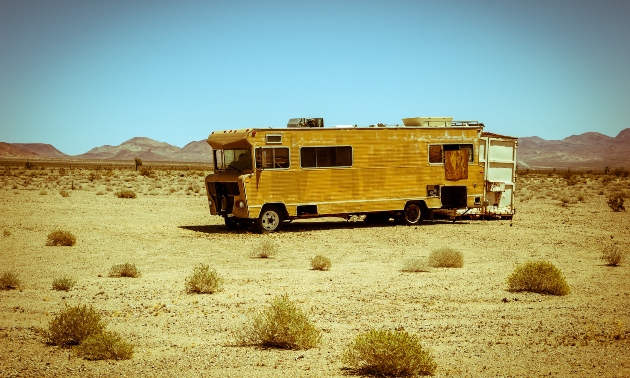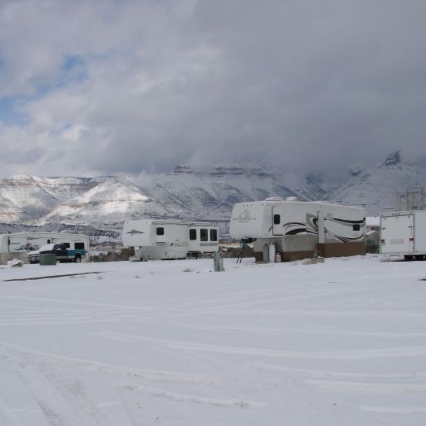Top 10 challenges that every full-time RVer contends with
RVing is not always sunshine and roses—but full-timers always find a solution

Let’s face it, some people paint full-time RVing with rose-coloured glasses and they focus on the romance of being free to travel the open road. They skip over or ignore mentioning some of the problems or challenges they’ve encountered along the way.
Yes, being a full-time RVer can be a wonderful way to live but there are challenges, and I would be lying if I said otherwise. Nothing is perfect and full-time RVing is no different. It’s best to face the reality of possible challenges and be prepared. Let’s discuss some of those challenges.
1. Small living spaces
Not everyone can deal with the limited amount of space an RV provides, especially if it’s their full-time residence. It’s so easy to become disheartened when some of your favourite belongings won’t fit in the RV and it’s too costly to pay for storage.
Most find that once they live in the RV for any period the freedom of the lifestyle makes up for the sacrifices they must make during the process. Sleeping in your own bed, using your own kitchen, and having your personal belongings with you whenever they’re needed is so much nicer than having to live out of a suitcase and changing hotels every night. That becomes a personal choice.
2. Lack of privacy
If you travel with a spouse or partner, you may find the small living space very confining and lack of privacy to be an issue. It’s important to be prepared for this and talk about it with your traveling partner so you can come up with a solution before it becomes a bigger problem than it needs to be. Some couples find that they become closer while others struggle with it.
3. Fuel Prices
It seems that fuel prices rise almost daily and if your plan is to travel in your RV extensively, you’ll need to be prepared for a large fuel bill.
Many choose to travel less and stay in each location for a longer period. There are benefits to doing this beyond the savings of fuel. Many campgrounds offer reduced fees for people who stay by the week or month, and you’ll have a chance to leisurely explore an area more extensively.
4. Maintenance
You might have thought by buying an RV you’ll reduce your household maintenance chores and expenses. Sorry, but RVs and most importantly RVs that are lived in full-time, require a great deal of maintenance. They’re not built the same as a house and things will go wrong – without a doubt. Having a regular maintenance plan and taking care of things right away will help alleviate future problems.
5. Finding campsites
They don’t seem to be building more campgrounds and there’s more RVs on the road each year searching for that special place to camp. Reservations have become necessary in the more populated areas and prices have skyrocketed, making RVing more expensive.
There are ways to work around this by being creative. Traveling mid-week or off-season will help and avoiding high density areas makes it easier to find a campsite. Planning in advance is recommended if you have our mind set on a certain location. Being flexible makes your travel experience more enjoyable.
6. Ten-year restrictions
Many campgrounds are questioning the age of your RV and aren’t thrilled if it’s over 10 years old. Of course, there are exceptions to this rule if your RV is in good condition and has been well taken care of. You may need to provide a photo of it before being accepted into the park. There have been instances of older RVs being abandoned in parks and the owners are then faced with the difficulty of having them removed which can become quite costly, which is one reason they are becoming picky about who can camp on their property.
Personally, we got quite worried about this fact but have since learned that by good communication regarding your well-maintained RV some park owners are flexible. In a park I’m familiar with I know the management tell people their RVs must be newer than 10 years, but I have seen many that are up to 20 years old in that same park because they’re in good condition.

- Photo courtesy Shutterstock
7. Budget
If the reason you’re moving into an RV is to save money, you might want to do a bit more research. It’ll also depend on the RV you purchase, the cost of parking it, insurance costs, maintenance, and what your long-term plans are. Being prepared for potential costs and knowing what they are in advance will make the decision much easier.
8. Financial restrictions and expenses
Many lending institutions will not lend money for an RV if it’s your full-time home. They’re concerned with the fact that the RV has wheels, and you may just disappear with it. It doesn’t seem to matter if you have good credit or not, they're often not receptive to these loans.
Insurance costs will probably be higher than if you’re living in a regular house. In B.C., you’ll need a licence plate which doesn’t cost a great deal of money—but you’ll also need a separate full-time living insurance policy, which may be costly—especially if you insure it for replacement costs. I consider the high cost of full-time RV insurance to be like our previous household insurance and the cost of our land taxes combined. If you’re properly insured, your protected but it doesn’t come cheap.
9. Depreciation of your RV
RVs do not gain in value. They depreciate as soon as you leave the dealership even if you lovingly take care of it and its in perfect condition. Buying used may be the answer if you can find a good deal on an RV that’s been well taken care of. If you plan on selling it in a few years, don’t be surprised at how low the value of your RV has dropped.
10. Breakdowns and living arrangements
What do you do if your RV needs to go into the shop for repairs and it’s your home? Do you hope the repair location will allow you to stay with it or do you go to a hotel? We faced this just a week ago and the price of a hotel room for just one night absolutely shocked me. I was grateful it was only for the one night and not more.

- Photo courtesy Shutterstock
RV living is not all doom and gloom!
The RV lifestyle can be the best thing a person could do. It provides you with the option of moving your RV anywhere you choose. The benefits can include experiencing many wonderful things; visiting places you would never have dreamed of before you started travelling and connecting with other RVers who could become lifelong friends.
Most people who decide to become full-time RVers wonder why they didn’t do it sooner—and yes, there are some who regret their decision. But that number is fewer than those who love the lifestyle. The secret is to be prepared, do your research, and know in advance what challenges you may face and prepare for them.
Remember, if full-time RV living is something you want to do there are challenges but they’re not insurmountable. There are thousands of Canadians living the RV lifestyle for a reason – it’s a great way to live.








